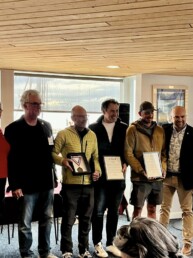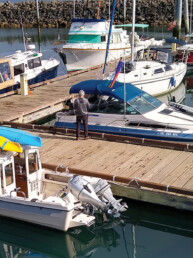With several references in this issue, I’m finding renewed amazement in the commonplace decision to have some of the crew asleep when a boat is underway. Of course, I’ve been there myself plenty of times both racing and cruising—within the structure of a watch schedule, an impromptu on-deck snooze, collapsing onto a pile of sails in full foulies cradled by the comforting darkness of carbon fiber, and everything in between.
Going to sleep on a traveling boat has seldom seemed remarkable in my experience. I imagine that holds true for most mariners, until you really start thinking about it; or consider other endeavors of significant commitment, high level performance, and pure adventure when it’s either improbable or entirely impossible to imagine any member of the team sleeping while others continue the pursuit.
Such relinquishment of control, especially in an environment that is inherently inhospitable, is an exercise that epitomizes trust. Even when engaged in activities that toe the ragged edge of real danger—when you might hold the lives of your collaborators in your hands—a group tends to either be engaged in that activity as a whole, or not. I’m not aware of mountaineers sleeping while other team members climb, for example.
Even in settings where a vehicle makes sleep possible for a portion of a team while others journey on—such as a van supporting a relay team sharing a long endurance run, or a dogsled tandem in which one person mushes while the other sleeps in the sled—the prospect of stopping is always near at hand. For people sleeping underway on boats, particularly those in remote or offshore locations, that’s not true, at least not immediately. When off the dock on any vessel, in order to stop, to really stop, to get off the ride… you always have to keep moving before you can arrive at a genuine endpoint.
I don’t intend to intimidate, but rather to express admiration for the kind of trust that is necessarily developed and bestowed among those sharing waterborne adventures. When you hand off a watch to get some shut-eye, you’re not just going to sit on the bench and keep watching the game or heading to bed at home with a “see you tomorrow.” You are turning off your consciousness while still in process, leaving all facets of the undertaking to the rest of your team. And in a few hours, you’ll return the favor. For those on passage, that’s the rhythm over and over and over again. One can understand how, soon enough, it doesn’t appear exceptional. But it is.
Many marine mammals with whom we share the water employ unihemispheric sleep, meaning half their brain sleeps while the other maintains enough consciousness to continue low levels of movement and retain some awareness of their surroundings. That’s how much of a team activity boating can be—a crew on a long voyage or race is a single unit, like an orca’s brain, divided into active and inactive component parts, but those components are themselves also whole. Pretty wild.
To me, this is another testament that ours is the ultimate family activity. Families that race or cruise together are sharing something unique, a pastime that all members are involved in as one. Parent of young children that I am, the prospect of that kind of teamwork and trust is so exciting I am lost for words at the thought. Add to that everything else that boat-life offers—lasting memories, deep connection with the natural world, skills and resilience in equal measure, and an absolute boatload of fun—and it’s easy to appreciate why so many of us reorder our lives around the passion for it.
Joe Cline
Joe Cline has been the Managing Editor of 48° North since 2014. From his career to his volunteer leadership in the marine industry, from racing sailboats large and small to his discovery of Pacific Northwest cruising —Joe is as sail-smitten as they come. Joe and his wife, Kaylin, have welcomed a couple of beautiful kiddos in the last few years, and he is enjoying fatherhood while still finding time to make a little music and even occasionally go sailing.






